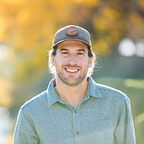So what did you learn from the wilderness trip, Christophe?
“So what did you learn from the wilderness trip, Christophe?”
asked my friend Max, on day seven of a nine day, hundred mile trip through the Sequoia National Park.
“That you don’t need to bring all your dishes at once”
I quipped, parroting back a comment he had just said to me as we were both in the middle of dish duty. Although I was joking, there might be something more profound in this insight. And there are many more learnings, so to do justice to the question, here are my answers.
Community is central to how we can become our best selves. Although transient, the fact that we had so many dishes to wash was a sign that we had become a community. Along with sharing meals, we looked out for each other, connected in depth, played games, scrambled up peaks on and off trail, and fished. By this time of our trip the Maxis (so duly called as it was the result of two Max’s organizing a trip) became 5, and the 4 who began and ended the trip together were guests of a friend who happened to be wilderness ranger 315 feeding us coconut curry and sourdough pancakes at the Rock Creek lodge. Beyond our own trail community, I felt beyond grateful to have plugged into an awesome community of wilderness rangers so essential to the durability of how we take care of our land. It pushed me to think about how the various communities and networks I’m part of and the various points of intersection lead back to all feeling on the same team, part of the same community.
Complete* disconnection on a regular basis is really valuable. Our trip took us across a map on a modified version of High Sierra Trail from Crescent Meadow to Cottonwood Pass. At various points — like on the summit of Mount Whitney — we had cell service but there was no internet, or otherwise connection to the outside world. I wish for everyone to have the luxury of taking schisms from reality in the wilderness, offline. It gives us time to reflect, remember, stretch, and decondition.
Memory is an important version of our truth. On the trail, memories are created and memories return. We tell ourselves memories silently, or as stories that weave into versions of who we are and how we see the world. They are there to shape us, adapt us, and guide us to be in the world.
Do things that push you to the edge. Hiking in the wilderness is one of several activities that can take you to the edge. These moments expand our perspectives and comfort levels with risk. The edge is where growth happens.
Informational capital is core to our well being. When crossing others on the trail, learning and reporting insights leads to a better experience. Amongst a community it’s super valuable to share what we know with each other. It’s worth a pause to put this in contrast to how people are in cities where they don’t stop to share basic information that would make everyone’s life better off.
Humans have done some really hurtful things to the planet. Walking through the giant Sequoias I feel great physical pain as well as acute anger when I think about the clearcutting of millions of thousand year old trees. Our damage from poor management decisions (that can still be reversed) is compounded from amplified fires and an out of control climate system. We now must dramatically scale up our reversal of this damage and grow more trees than we lose.
The National Parks should get more money. It’s disappointing that we’ve defunded important ecological work that has paused decades of field notes and research. This is core to our collective understanding for maintaining and growing resilient systems. We can turn this around. Write a strongly worded letter to your senator.
We should continue to remind ourselves that we are part of nature. During the trip I read “The Red Deal”. It is a movement-building manifesto that seeks — on some level — to outflank progressive politics and return native wisdom to heal our planet. Among the many calls to action in the book is to be for, not against something. That means for every place in the world there is an appropriate way to be native to it and care for it in the best possible way. Our current paradigm has us on a trajectory to our peril. But it’s only a relic of old rules, ignorance, settling for bad deals, and decisions about how we live. We have the opportunity to all be for planetary restoration, learning from the past, and working for the future.
